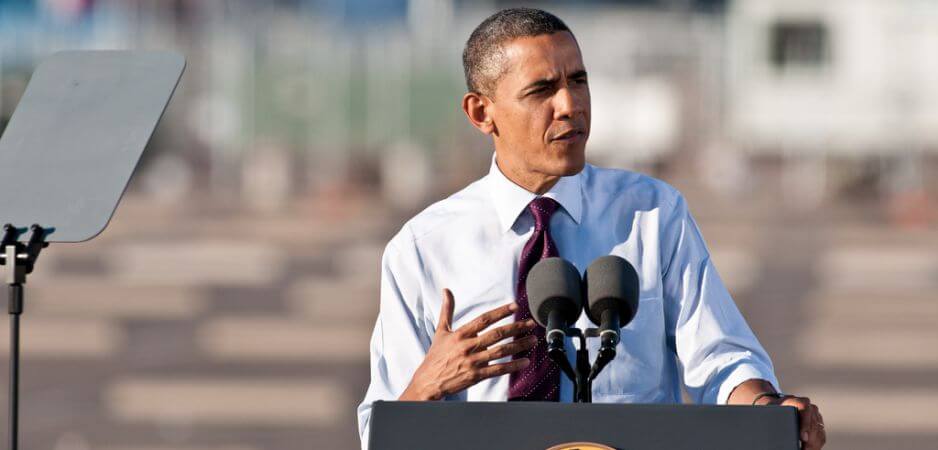President Obama has joined a long list of US presidents who failed in their Middle East policy.
The Middle East may be where grandiose policies by well-intentioned but naive US presidents run aground. Despite some success, American presidents since Jimmy Carter have been known more for their failures in the troubled region—in Carter’s case, his handling of Iran’s Islamic Revolution and subsequent hostage crisis—than their successes (Carter’s signature Camp David Accord between Egypt and Israel).
With the possible exception of George H.W. Bush, whose one term in office perhaps rescued him from a failure that might have tainted his leadership of the historic coalition that ousted Saddam Hussein from Kuwait in 1991, US presidents have met with disappointment, defeat and sometimes outright humiliation. Barack Obama now joins that distinguished line of presidents who failed to bring peace to the Middle East.
When he took office eight years ago, President Obama set lofty goals for US foreign policy. His 2009 Cairo speech took an odd—for a US president—twist by offering a mea culpa for America’s faulty record in the Middle East. But the soaring rhetoric of that speech was hardly matched by action. As viewed by many in and outside the region, America’s 44th president followed a well-trodden path.
With little experience in either foreign policy or national security, Obama laid out goals that tended to be values-driven. That is often the case with newly inaugurated presidents lacking the real-world experience in which America’s interests more typically trump its values. Critics of Obama’s foreign policy record point out that he failed on both counts, most especially when viewed through the lens of the Middle East.
IRAN, IRAQ AND THE HOLY LAND
Three top-level objectives that President Obama set out to achieve were the withdrawal of US forces from Iraq, a war then approaching its sixth year; resolution of the region’s most enduring conflict between the Israelis and Palestinians; and a solution to the Iranian nuclear challenge.
Only the latter can be considered an achievement, but even so one harshly criticized by many. Nevertheless, it succeeded in avoiding what might easily have escalated into a military confrontation between the United States and Iran. The accord, negotiated over a protracted period with the other P5 members and Germany, at the very least postpones an Iranian effort to develop nuclear weapons. It does not, however, prevent Iran from ever developing such weapons—a potential challenge that Obama’s successors are left to confront.
Both of Obama’s efforts to address the Israeli-Palestinian conflict—a first led by the much respected Senator George Mitchell from 2009-11 and a second by a newly installed Secretary of State John Kerry from 2013-14—failed to make progress and may even have set the process back. Israelis remain determined to proceed with settlement expansion in the West Bank, and Palestinians equally adamantly refuse to come to the negotiating table.
Additionally, there is increased talk of a one-state solution, in contravention to more than 40 years of US policy, several United Nations Security Council (UNSC) resolutions and the view of mostly everyone in the international community. Obama’s fit of pique in abstaining from the UNSC resolution in December 2016 condemning Israel’s West Bank settlement activity, and Secretary Kerry’s subsequent rant largely blaming Israel for failures to resolve differences, did little to advance the process. The two sides remain as far apart as they have ever been.
President Obama managed to withdraw US forces from Iraq by the end of 2011, but against the counsel of many of his military and diplomatic advisers, who preferred a residual force of 5,000 to 10,000 troops to advise the Iraqis and serve as a bulwark against Iranian intervention and terrorist reemergence. As a result of the Islamic State’s (IS) insertion in Iraq in late 2013, the US now has some 5,000 troops deployed there. Now remobilized, Iranian-supported—and often Iranian-led—Shia militias also threaten Iraq’s long-term stability and democratic evolution.
OBAMA’S RED LINE IN SYRIA
Obama is also blamed for allowing the Syrian Civil War to reach tragic proportions and for failing to respond to the “responsibility to protect” Syria’s hundreds of thousands of civilians killed or injured and millions forced to flee their homes. While the president may wish to take credit for “keeping America out of another Middle East war,” the consequences of Washington’s inaction and ultimate inability to end the nearly six-year conflict must weigh on the nation’s conscience (and most certainly his) and reverberated within the region and into Europe.
The brutal Syrian regime and its titular head, Bashar al-Assad, whose demise Obama predicted back in 2012, seem set for the long haul. They may thank the scorched earth strategy of their Russian and Iranian backers.
Syria now joins Cambodia, Rwanda and Srebrenica as a colossal humanitarian catastrophe and appalling human slaughter, which the rest of the world stood and watched from the sidelines, including the lone superpower and its values-driven president.
ARAB SPRING
Then there was the so-called Arab Spring. When it first blossomed, it seemed to promise an outbreak of reform and even democratization throughout a region historically bound by the chains of authoritarianism and state repression.
America was forced to choose between its deepest democratic values and its interests in states and allies in a vital and distressed region. While President Obama cannot be held responsible for the disappointments of the Arab Spring—Egypt remains in the grip of even harsher military rule (with the apparent support of the Egyptian public) and Libya, Yemen and Syria have become failed states undergoing varying degrees of civil war—one must ask: Could America and its valued-driven president have done more to bring about the changes sought by all those courageous demonstrators in the spring of 2011?
Perhaps not, but absenting itself as it has done in the latter three cases and acquiescing in Egypt seem to be a surrender of America’s near-50-year record of often criticized but mostly welcomed leadership in the Middle East.
And that may be the ultimate legacy of Obama in the Middle East and perhaps even around the world. The president submitted the noble American Gulliver to the Lilliputians for binding by the cords of diminished stature, presence and effectiveness amidst continuing challenges to its interests and those of the world. The country’s credibility in and commitment to this vital region are now openly questioned, including by its closest allies such as Israel, Saudi Arabia, Jordan and the Gulf Cooperation Council.
If leaving a legacy means that the outgoing president sets America on a path that successors will follow, then in the Middle East, President Obama leaves no legacy.
The views expressed in this article are the author’s own and do not necessarily reflect Fair Observer’s editorial policy.
Photo Credit: Nick Knupffer
Support Fair Observer
We rely on your support for our independence, diversity and quality.
For more than 10 years, Fair Observer has been free, fair and independent. No billionaire owns us, no advertisers control us. We are a reader-supported nonprofit. Unlike many other publications, we keep our content free for readers regardless of where they live or whether they can afford to pay. We have no paywalls and no ads.
In the post-truth era of fake news, echo chambers and filter bubbles, we publish a plurality of perspectives from around the world. Anyone can publish with us, but everyone goes through a rigorous editorial process. So, you get fact-checked, well-reasoned content instead of noise.
We publish 2,500+ voices from 90+ countries. We also conduct education and training programs
on subjects ranging from digital media and journalism to writing and critical thinking. This
doesn’t come cheap. Servers, editors, trainers and web developers cost
money.
Please consider supporting us on a regular basis as a recurring donor or a
sustaining member.
Will you support FO’s journalism?
We rely on your support for our independence, diversity and quality.







